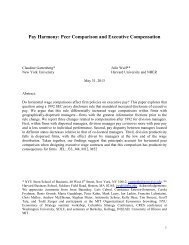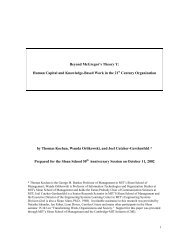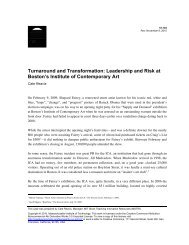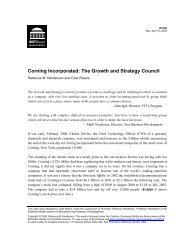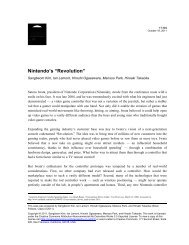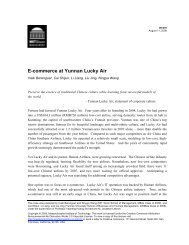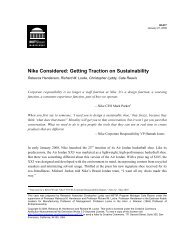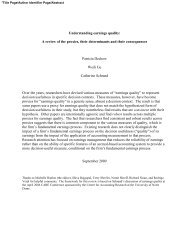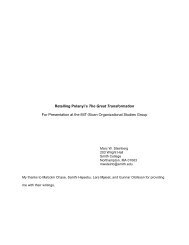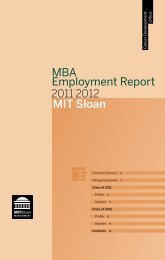09-094 - Empowering Lives in Kenya (ELIK) - MIT Sloan School of ...
09-094 - Empowering Lives in Kenya (ELIK) - MIT Sloan School of ...
09-094 - Empowering Lives in Kenya (ELIK) - MIT Sloan School of ...
You also want an ePaper? Increase the reach of your titles
YUMPU automatically turns print PDFs into web optimized ePapers that Google loves.
EMPOWERING LIVES IN KENYA: THE CHEBAIYWA CLINIC<br />
Paul Cassleman, Burt LaFounta<strong>in</strong>, Brian Newkirk, Akbar Thobhani<br />
education to ma<strong>in</strong>ta<strong>in</strong> their knowledge and skills <strong>in</strong> both medic<strong>in</strong>e and customer service. Provid<strong>in</strong>g<br />
attentive and personalized customer service was a significant challenge for the sizable staff, who had<br />
m<strong>in</strong>imal process standardization and little experience th<strong>in</strong>k<strong>in</strong>g from the customer’s po<strong>in</strong>t <strong>of</strong> view.<br />
At the outset, the Cl<strong>in</strong>ic’s services were <strong>of</strong>fered at no cost to the patients, funded <strong>in</strong>stead by donations<br />
by Americans and <strong>Kenya</strong>ns. Often, mission doctors would arrive for one- or two-week st<strong>in</strong>ts,<br />
provid<strong>in</strong>g free specialty services such as dental or eye care. In 2004, however, th<strong>in</strong>gs changed.<br />
Fund<strong>in</strong>g issues and the dictates <strong>of</strong> ELI’s long-term strategy—namely try<strong>in</strong>g to balance its core<br />
missions <strong>of</strong> m<strong>in</strong>istry and education with provid<strong>in</strong>g community services—pushed the Cl<strong>in</strong>ic to<br />
transition to fee-for-service care. Even though these fees were two to three times less than those<br />
charged by private cl<strong>in</strong>ics, many community members were upset, and accused the committee <strong>of</strong><br />
greed and fail<strong>in</strong>g to adhere to the ELI mission. Indeed, some Cl<strong>in</strong>ic staff silently dissented with the<br />
new policies, and refused to charge fees or greatly reduced them for patients <strong>in</strong> need.<br />
The fees charged by the Cl<strong>in</strong>ic were set to cover variable costs such as medic<strong>in</strong>es and supplies with<br />
an approximate 30% marg<strong>in</strong>, but were <strong>in</strong> the end wholly <strong>in</strong>adequate to cover all operat<strong>in</strong>g expenses.<br />
(See Exhibit 7 for the 2008 <strong>in</strong>come statement.) By 20<strong>09</strong>, the Cl<strong>in</strong>ic was runn<strong>in</strong>g an annual deficit <strong>of</strong><br />
approximately 1.4 million Ksh on revenues <strong>of</strong> 490,000 Ksh, a nearly 300% deficit. Under pressure<br />
from the committee to become more “susta<strong>in</strong>able,” Cl<strong>in</strong>ic staff had recently begun to enforce a strict<br />
policy on patient debts, which angered some patients and yet made very little impact on the bottom<br />
l<strong>in</strong>e. With the global economy contract<strong>in</strong>g and charitable donations shr<strong>in</strong>k<strong>in</strong>g, Tarus and other<br />
committee members were concerned about the Cl<strong>in</strong>ic’s future viability. Tarus also believed that the<br />
long-term solution to provid<strong>in</strong>g quality healthcare <strong>in</strong> Kipkarren was economic development. It was<br />
risky to rely on donor aid because it could dry up. By foster<strong>in</strong>g the economic health <strong>of</strong> the<br />
community, the ELI approach held the promise that patients could eventually afford to support their<br />
own cl<strong>in</strong>ic for generations to come.<br />
What would it take to make the Cl<strong>in</strong>ic f<strong>in</strong>ancially viable? Was it even reasonable to th<strong>in</strong>k that the<br />
community could support the Cl<strong>in</strong>ic?<br />
The Path Forward<br />
Bra<strong>in</strong>storm<strong>in</strong>g late one night with his wife, Allison, and chief deputy, Peter, Tarus had begun to<br />
consider several areas <strong>of</strong> change which might have a f<strong>in</strong>ancial impact on the Cl<strong>in</strong>ic.<br />
Quality Improvements<br />
Tarus had a feel<strong>in</strong>g that the quality <strong>of</strong> overall customer care could be better at the Cl<strong>in</strong>ic. But, at the<br />
same time, he felt that the quality <strong>of</strong> care available at government cl<strong>in</strong>ics was significantly worse. For<br />
example, government cl<strong>in</strong>ics had rout<strong>in</strong>e stockouts <strong>of</strong> necessary medic<strong>in</strong>e, and Tarus had heard only<br />
occasional compla<strong>in</strong>ts that Chebaiywa didn’t have medic<strong>in</strong>e—for the most part, medications seemed<br />
to be available.<br />
August 13, 20<strong>09</strong> 8



